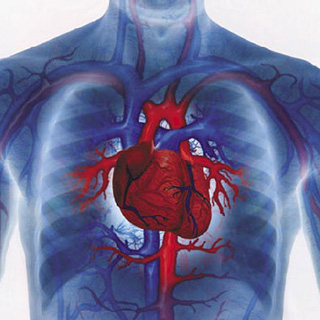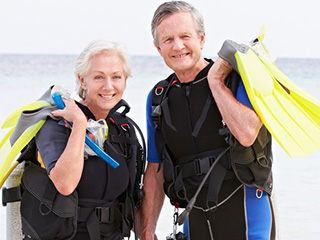"Over 19 years making dreams come true for divers... just like you"
Contact us now at ask@dive-the-world.com
Diving Trip Newsletter
Diving with a healthy heart
It is increasingly likely that when you are on your next diving vacation, at least one person on your liveaboard cruise will have from some form of heart disease. It may even be you!
This should not come as a surprise, as cardiovascular diseases claim more lives than all forms of cancer combined. The American College of Cardiology states that the dominant risk of sudden death for divers over 35 years old in sport diving, is from coronary disease. Many individuals are not even aware of their condition, and some (men in particular) who are aware, have been known to incorrectly complete the medical questionnaire when signing up for a diving vacation.
We are definitely not medical experts, so let’s explore the following scenarios from a layman’s perspective.
- What do you know about heart disease?
- How does heart disease impact your recreational scuba diving lifestyle?
- Is cardiac surgery the death of your diving days?
What is heart disease?

The Mayo Clinic provides a brief description of heart disease. "The term 'heart disease' is often used interchangeably with the term 'cardiovascular disease'. Cardiovascular disease generally refers to conditions that involve narrowed or blocked blood vessels that can lead to a heart attack, chest pain (angina) or stroke. Other heart conditions, such as those that affect your heart's muscle, valves or rhythm, also are considered forms of heart disease.".
Anyone who has any form of heart disease is at risk, particularly when diving, until the condition is treated. Many patients are unaware that they suffer from heart disease until they experience a dramatic episode such as a heart attack. Survival rates are of course much higher if you're on dry land than in water. It is preferable that scuba divers address this condition before it results in an underwater attack.
Diving with heart disease
One of the most common medical conditions nowadays is hypertension or high blood pressure. This is often due to our sedentary lifestyle, over indulgence in the wrong types of food, and increased alcohol consumption. It is therefore not a stretch that it is also common for many divers to have high blood pressure. For the sake of this article, let's say that 'normal' blood pressure is systolic pressure below 140 mm Hg, and a diastolic pressure below 90 mm Hg (e.g. 140 over 90).
If you suffer from high blood pressure you are at risk of either short-term or long-term complications or both. Extremely high blood pressure may cause blood vessels in the brain to rupture and result in a stroke. Individuals who suffer from prolonged high blood pressure may experience eye problems, kidney disease, coronary artery disease, congestive heart failure, and cerebrovascular disease.
While this all sounds rather terrifying, the good news is that mild hypertension can be controlled with diet and exercise. The positives of a change in lifestyle will have a knock-on effect on your diving enjoyment too. Being fitter and lighter is sure to make scuba a more pleasurable experience and one you can enjoy further into the future. Your dive times may even increase and diving into your retirement years may become a possibility.

If medication is required to keep your blood pressure in check, be sure to discuss the possible side effects of the chosen treatment with your doctor beforehand. According to James Caruso (M.D.) (consulting physician for Divers Alert Network), ACE (angiotensin converting enzyme) inhibitors are the preferred class of drugs for treating hypertensive divers. Some medications may cause light headedness, and some are diuretic in nature. If the latter is prescribed, you will need to pay special attention to keeping hydrated and monitor your electrolytes, especially when doing multiple dives a day. If you are taking new medication and are planning a diving holiday, take some time to see how you react to the new drugs, so you're not disappointed once you are at your dive location.
Coronary artery disease is basically the narrowing and hardening of the walls of the arteries of the heart. The results are a decrease of oxygenated blood to the heart muscles. Exercise, such as finning against the current, aggravates the situation. During exercise, the heart muscle needs more oxygen, however it cannot be delivered due to the coronary atherosclerosis. The myocardial tissue may get deprived of oxygen and can result in abnormal heart rhythms, myocardial infarction, and/or heart attack.
Indicators and signs of heart attacks
If we are to consider one indicator of risk, look at your waist line. A waist measurement of 37 inches (men) or 31.5 inches (women) indicates and increased risk of having a heart attack. High risk measurements are 40 inches or more for men and 35 inches or more for women.
Woman should be more aware of the potential symptoms associated with having a heart attack. Often the signs are milder in women than in men. Heart attack survivors have described experiencing the following symptoms prior to the attack:
- Chest pain
- Shortness of breath
- Palpitations
- Fatigue
- Discomfort in one or both arms, the back, neck, jaw or stomach
- Experiencing a cold sweat, nausea or lightheadedness
The bottom line is that if you suffer from coronary artery disease, or suspect that you may, do not dive until you have received treatment.
Heart surgery, recovery and returning to diving
Heart surgery is the most common treatment for heart disease and other cardiovascular issues. These may include bypass surgery, valve replacement, coronary angioplasty or stent replacement. Bypass requires full open-heart surgery and therefore a longer recovery time, the least invasive being the coronary angioplasty. Every situation is different with many variables that will contribute to recovery time. This may take as little as 3 weeks or as long as 1-3 years.
The good news is that after successful surgery, the heart muscle should receive a normal supply of oxygen and the diver can begin the road to recovery and in time return to their much-loved sport. With proper physical rehabilitation and lifestyle adjustments the patient will be ready to undergo a full cardiovascular examination.
During the examination, the patient will have to demonstrate that they do not experience any symptoms, such as chest pains, or EKG changes while undergoing a thorough cardiovascular evaluation. This includes performing an exercise stress test. Essentially patients are required to run on a treadmill at a speed of 4.2 mph / 8:50 min/km with an incline of 16%.
This test will take place under the supervision of appropriately trained medical staff. EKG leads are attached to the patients chest. The treadmill will be set to 2.74 km/hr (1.7 mph) with an incline (gradient) of 10%. At 3 minute intervals the incline of the treadmill will increase by 2% and the speed will be increased to 4.02 km/hr (2.5 mph) then 5.47 km/h (3.4 mph) and finally 6.76 km/h (4.2 mph) when stage 4 is reached (the Bruce Protocol stage 4 at a performance level of 13 mets is required for your doctor to sign off for you to be considered fit to dive). This is no easy feat, especially if you have endured open-heart surgery. Once you have your medical certificate in hand, you can comfortably return to recreational scuba diving in warm climates with minimal currents.
Now that we all know what to be aware of, if you are in any doubt, get it checked out. Take care of your health, and our Dive The World team will take care of all your scuba diving vacation bookings!
So take the plunge!
Increase your heart rate by a safely insignificant extent by getting excited about the scuba diving possibilities that await you ...
CUSTOMER TESTIMONIALS OF DIVE THE WORLD
... Pip is always doing a greeat job, very helpful, attentive, fast answering. And we love the discount! More discounts ;-) ... -- Justin Becker, Germany. [More customer reviews]






